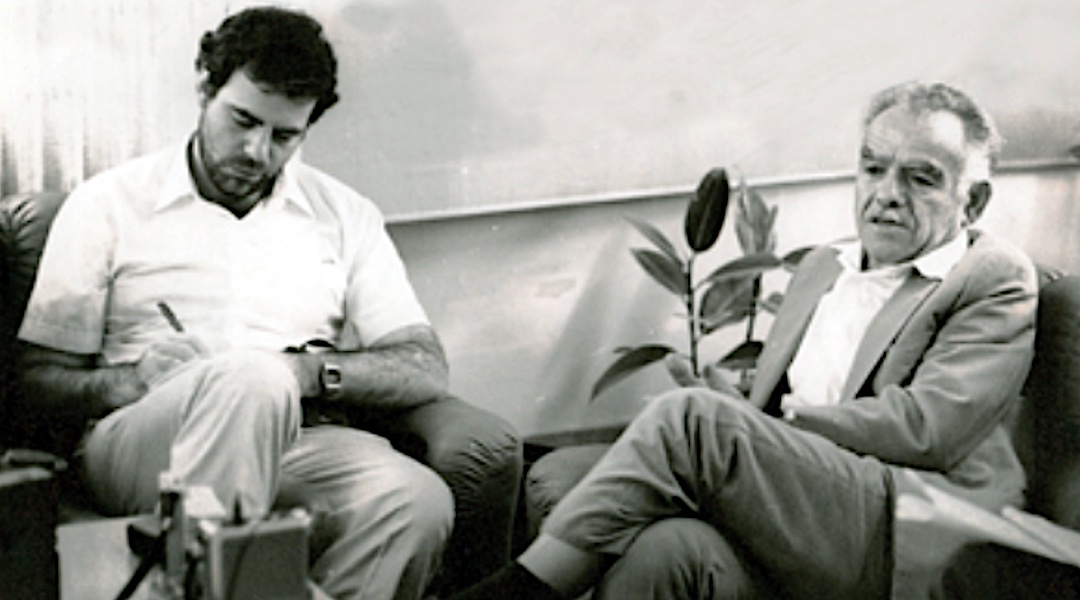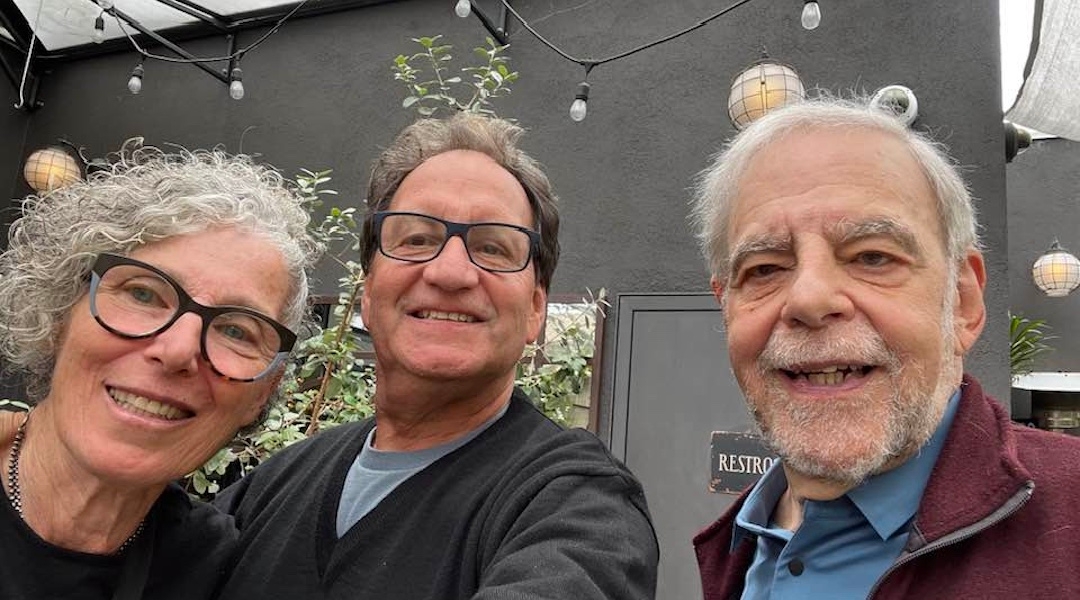Marc Klein, Bay Area editor who led Jewish journalism into the digital age, dies at 75
The former Philadelphian kept up with changes in the news industry in nearly three decades at the helm of the paper he renamed “J”

Marc Klein interviews Israel’s then-foreign minister, Yitzhak Shamir, in the early 1980s. (Courtesy J.)
(J. via JTA) — In 1984, when Marc Klein showed up in San Francisco, the Jewish Bulletin was just that: a community bulletin that ran on mimeographs, manual typewriters and carbon paper. By the time he completed his nearly 28-year tenure as editor and publisher, a thoroughly modernized Bulletin — renamed J. in 2003 — had become inarguably one of the nation’s best Jewish newspapers.
Klein, the old-school newsman who guided J. into the digital age, died on May 25 from complications of transplant-related cancer. He was 75.
“He thought the paper was essential,” recalled former J. publisher Nora Contini. “Marc felt an independent Jewish publication was really important, and he wasn’t afraid of standing his ground about that.”
Added former J. managing editor Sherwood Weingarten, “Under his auspices, the paper went from a small community weekly into a much larger operation that concentrated much better on news than it had before.”
Marc Klein grew up in a tight-knit Jewish neighborhood in northeast Philadelphia. As a student at Lincoln High School, he became a reporter for the school paper. He later attended Penn State University where he majored in journalism and served as a staff writer for the Daily Collegian. While at Penn State, he met his future wife, Sandy, at a 1968 Hillel Shabbat service.
After graduating, Klein worked as a reporter for the Evening Bulletin in Philadelphia, becoming assistant managing editor of the newspaper when he was just 30. He polished his skills in the Jewish press serving as editor of the Philadelphia Jewish Exponent before landing the post of editor and publisher of the Jewish Bulletin, the fifth in the paper’s history up to that time. He moved to the Bay Area in 1984 with his wife and daughters, Emily and Suzy, settling in Alameda.
What he found at the Bulletin was a nearly 100-year-old newspaper in desperate need of an upgrade.
“It was a great challenge to take a paper that some people still called the ‘shmooze gazette’ and turn it into a publication that reflected the community it covered,” Klein said in a 2011 J. story about his impending retirement.
Contini, whom Klein hired to serve as business manager, remembered those early days.
“It was 1984, but it was like 1960,” she said. “So that first year there was rapid change. We moved offices. We bought computers. We went from going to a typesetting shop, to desktop publishing, to the internet. We were the first Jewish newspaper to create a website.”
The website launched in 1995. Besides his flair for technology, Klein had an eye for talent, hiring newsroom personnel who stayed for years and many who went on to work at prominent publications. He also deftly handled the politics of the diverse Bay Area Jewish community. Weingarten, who served as managing editor for 23 years, took note of Klein’s skills.

Marc Klein, right, with Nora Contini, the former publisher of J., and Rich Waloff, the former publisher of the New York Jewish Week, Oct. 2023. (Courtesy rich Waloff)
“He was able to keep most of the board members, local politicians and loudmouths at bay,” Weingarten said. “I think we had the best writers available, better than any other small publication. Marc also had contacts through JTA and the American Jewish Press Association who were all over the country, and he used them for the benefit of the Jewish Bulletin.”
One of the reporters Klein hired was Alix Wall, a staff writer from 2000 to 2006. She continues to write for J. as a freelancer.
“I cold-called him from New York and told him I was thinking of moving to the Bay Area,” recalled Wall. “He said, ‘Your timing is impeccable. I just had a reporter give notice. I would love you to take this job.’ In the end I took the job because of Marc and how he made me feel. I knew I wouldn’t have a better boss than him.”
Joe Eskenazi is today the managing editor of the Bay Areas news site Mission Local and has served in senior editorial posts at the SF Weekly and San Francisco Magazine. But his professional reporting career began at the Jewish Bulletin, where he served as staff writer from 2000 to 2008.
“It was like a newsroom from a different time: a louder time,” Eskenazi said. “Lots of talking, lots of yelling. A more familial atmosphere. You could do a lot of things. It was a great place to build up skills… in reporting, writing, time management and diplomacy. We also put out a pretty good paper. I think Marc faced a lot of blowback. For all of the constriction one might feel with the politics of the Jewish community, Marc deserves credit for getting the fair multiplicity of voices into the paper.”
One of those voices was his own. In 2008, Klein won a first-place Rockower Award from the American Jewish Press Association for his cover story “Why Is Hibuki Unhappy?” about Israel’s use of play therapy to treat children traumatized by war.
Klein also served as president of the AJPA for multiple terms and as president of his congregation, Temple Israel of Alameda.
With the economics of journalism in America shifting rapidly, Klein, along with the newspaper’s board and senior management team, decided the best way to ensure the publication’s future viability was to become a 501(c)(3) nonprofit.
“We came to recognize toward the end of the ’90s that the Jewish Bulletin, in its old print newspaper approach, was a dinosaur,” remembered longtime J. board member Lou Haas. “So we got busy changing the format, changing the name [to J.]. Marc absolutely supported the name. Federation got on board. And it was a fait accompli.”
In August 2013, after a two-year process, J. became a nonprofit.
In a 2011 column, Klein wrote of his pride in the thousands of “routine stories we covered over the years,” touching on everything from the work of Jewish Family and Children’s Services to the construction of new Federation buildings, three JCCs on the Peninsula, the Contemporary Jewish Museum, two Jewish high schools and other Jewish facilities across the Bay Area.
“The telling of that history was more important than writing award-winning stories,” Klein wrote. “The quality of a newspaper can be judged only by the work it does educating its readers week in and week out.”
There were also times when major stories broke, including one that nearly broke the Bay Area: the Loma Prieta earthquake, which struck on Oct. 17, 1989, killing 57 people, damaging the Bay Bridge, collapsing a portion of I-880 and disrupting the third game of the World Series between the San Francisco Giants and the Oakland A’s. (Klein was a loyal A’s fan.)
Despite the calamity, he insisted that the Jewish Bulletin publish that week.
“He really engineered the paper coming out and being printed despite the earthquake,” Weingarten recalled. “We all went into the office, a few worked from home by phone, and everyone did their jobs. The trucks went out, and everything worked like clockwork after the clock had stopped.”
There was another time Klein himself made news. In early 2012, he began experiencing renal failure, and J. wrote about his search for a match for a kidney transplant. A local woman named Toby Adelman, a longtime reader and fan of the paper, responded and turned out to be a perfect match. And it made a perfect cover story for J.
By then, Klein had retired from J., gearing up for the next great adventure in his life. Both his daughters had become pregnant around the same time, and soon, Klein and Sandy were busy with the joys of grandparenting. “He was able to do that deep dive into grandpa life,” said daughter Emily. “That was a full and satisfying life for him.”
Klein never stopped consuming the news. His daughter said that even in retirement, her father “wanted to have his finger on the pulse of the Jewish community. He didn’t really have hobbies. He wanted to read the news and talk to people all the time, all in the service of being on top of every breaking story.”
As for his legacy, it’s available for all to see in the pages of the publication he guided over nearly three decades.
“I was never one to rest on our laurels,” Klein said in 2011. “Even today I don’t like to reminisce about one story being more important than another. I don’t want to be known for any one specific issue or one piece of history we covered. Instead I’d like to be known for consistently publishing one of the best Jewish papers in the country.”
He is survived by wife Sandy Klein of Alameda; daughters Suzy Klein and Emily Klein; and three grandsons.
This article originally appeared on JTA.org.














